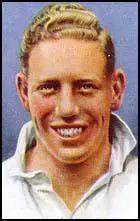Willie Hall

George (Willie) Hall was born in Newark on 12th March 1912. A talented inside-forward he signed for Notts County in 1930. After scoring seven goals in 34 games he was transferred to Tottenham Hotspur in 1932 for a fee of £2,500.
Hall won his first international cap for England against France on 6th December 1933. The England team that day also included Eric Brook, George Camsell, Wilf Copping, Sammy Crooks, Percy Grosvenor and Henry Hibbs. England won 4-1 but Hall was dropped from the team.
Tottenham Hotspur was relegated to the Second Division at the end of the 1934-35 season. This did not help Hall's international career. However, his form remained good and on 23rd October 1937 he was recalled to the England team that played Northern Ireland at Old Trafford. Hall had an amazing match scoring all of England's five goals. This included the fastest hat-trick ever recorded in an international game. Tommy Lawton later wrote that: "Willie Hall was a ball player of the highest class. He could make a football do the most alarming tricks. On top of that, he had an uncanny understanding with Stan Matthews, and he proved on many an occasion that he could hit them... just think of that England v Ireland debacle at Old Trafford, Manchester."
Stanley Matthews played in the game against Northern Ireland when Hall scored all five goals: "Willie was full of emotion back in the dressing room and cried unashamedly as each of his team-mates in turn congratulated him on his outstanding performance and his England goalscoring match record. He was the most unassuming of men, modest to a fault. His unselfish play and great contribution to a game was never truly appreciated by the sports writers of the day."
Hall was also selected for the games against Wales (2-0), Czechoslovakia (5-4), Scotland (0-1) in the 1937-38 season. The following season he played against FIFA (3-0), Northern Ireland (7-1), Scotland (2-1), Italy (2-2) and Yugoslavia (1-2). The England team that season included Wilf Copping, Eric Brook, Frank Broome, Sam Barkas, Stanley Matthews, Jack Crayston, Tommy Lawton, Eddie Hapgood, Albert Geldard, Vic Woodley, Stan Cullis, Cliff Bastin, George Male, Joe Mercer, Len Goulden, John Morton and Bert Sproston.
The outbreak of the Second World War brought an and to his international career. Hall had scored nine goals in ten games for his country. During the war Hall was a member of the London Police Reverve. He continued to play friendly matches but a serious injury brought his career to an end.
In 1945 Willie Hall had to have his right-leg amputated. The following year thrombosis meant he had to have his left leg removed. In 1946 testimonial games were played at both Tottenham Hotspur and Notts County. As Tommy Lawton pointed out: "What a tragedy it was that Willie should lose both his precious legs, the legs that had thrilled us all in football for many a year."
Willie Hall, who later worked as a publican, died in Newark on 22nd May 1967.
Primary Sources
(1) Tommy Lawton, My Twenty Years of Soccer (1955)
Willie Hall was a ball player of the highest class. He could make a football do the most alarming tricks. On top of that, he had an uncanny understanding with Stan Matthews, and he proved on many an occasion that he could hit them... just think of that England v Ireland debacle at Old Trafford, Manchester.
What a tragedy it was that Willie should lose both his precious legs, the legs that had thrilled us all in football for many a year. Fate played a scurvy trick on Willie Hall, but football history will never forget him. He was a great player and a great character.
(2) Stanley Matthews, The Way It Was (2000)
Willie was full of emotion back in the dressing room and cried unashamedly as each of his team-mates in turn congratulated him on his outstanding performance and his England goalscoring match record. He was the most unassuming of men, modest to a fault. His unselfish play and great contribution to a game was never truly appreciated by the sports writers of the day.
